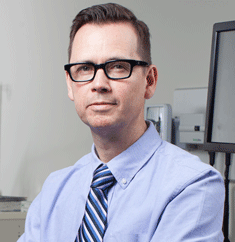April is Oral Health Month, which is no doubt a delight to dentists, but makes more than a few people squirm in their seats. When we think of oral health, we think of dentistry, drills, and daily flossing. However, oral care extends well beyond the dentist’s chair, and presents a number of challenges in the hospital environment.
We sat down with Bloomberg Nursing Assistant Professor Craig Dale, who is also an Advanced Practice Nurse at Sunnybrook Health Sciences Centre, to learn more about his research into the oral health of critically ill intubated patients, its importance, and its impact.
How did you become interested in oral health?
As an intensive care unit (ICU) nurse I have had the opportunity to look inside thousands of mouths and was often shocked by what I observed. In the ICU, we place multiple tubes through the mouth to assist with breathing, nutrition, and monitoring. This contributes to oral dryness, discomfort, and infection risks. Although I am not a dental health professional, I quickly became interested in improving oral care for this vulnerable population. I see it as a natural extension of my nursing practice.
Why is oral care important for non-dental health professionals to consider?
A growing number of Canadians have unmet oral health needs – in 2014, the Canadian Academic of Health Sciences (CAHS) published a report about the growing inequity in oral health for Canadians. With over 90% of oral care located in the private sector, it can be largely unaffordable for those without employment-related insurance or other dental benefits, meaning those experiencing the highest level of oral health problems have the most difficulty accessing oral health services. A growing number of individuals are delaying dental care until it becomes an emergency, with some patients visiting their local emergency department for non-traumatic oral problems.
Why are we slow to embrace the importance of oral health in Canada?
While oral diseases are highly prevalent, they are seldom seen as life-threatening. Scientists suggest this is one reason we underestimate the importance of preventative oral care. The other problem is a longstanding imbalance in universal oral health funding which normalizes inattention to this issue. Nevertheless, science is helping us rethink the importance of oral care. For example, scientific links between gum disease and cardiovascular illness, poor childbirth outcomes, and pneumonia are now established. The growing costs of treating these oral-systemic health problems will likely drive future oral health policy in Canada.
What are the potential impacts of poor oral health on hospital services?
The lack of integration of dental professionals into hospitals and long-term care settings is worsening oral health inequity. This means nurses, allied health professionals, and physicians must step in to prevent serious oral-systemic health problems. There are hundreds of ‘good’ bacteria living in our mouths which comprise a complex ecosystem. In illness, this ecological balance is upset and disease causing bacteria can multiply. Aspiration of oral bacteria into the lungs can precipitate pneumonia in hospitalized patients. With the advent of antibiotic resistant infections, pneumonia has become increasingly difficult and costly to treat. Thousands of hospitalized patients in Canada need assistance with oral care every day. Unfortunately, nurses and physicians do not commonly receive ‘hands-on’ oral care training. This resource gap has implications for patient safety and outcomes.
How is your research making an impact?
My research is making an impact by increasing the visibility of oral care delivery challenges. In exploring technical and behavioural barriers to oral care, I am foregrounding nursing work that is often taken-for-granted. For most people, oral care takes place in the confines of the home; it is a private act of hygiene. My research tackles this visibility problem in hospital where oral care is often overshadowed by complex medical interventions. Canadian hospitals represent an enormous investment in health. If we cannot get the fundamentals of care right, then highly complex medical interventions will not easily succeed. As nursing, allied health, and medical professionals are expected to play a larger role in the oral health of Canadians, knowing more about its benefits and challenges makes good sense.
